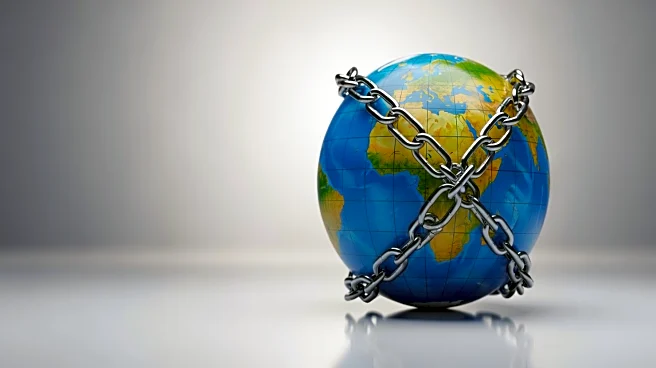What's Happening?
The New Development Bank (NDB), established by BRICS countries, is under scrutiny for its reliance on the US dollar and governance issues. Despite its founding goal to offer alternatives to Western financial systems, the NDB's operations remain predominantly
dollarized, with 75% of borrowings in US dollars. Critics argue that this undermines BRICS' de-dollarization efforts. The bank has faced challenges such as slow project implementation and internal management issues. The NDB's governance is criticized for lack of transparency and ineffective board operations. The bank's focus on infrastructure projects, including renewable energy, is seen as insufficiently 'green' by some observers.
Why It's Important?
The NDB's reliance on the dollar and governance issues highlight the challenges faced by BRICS in establishing a viable alternative to Western financial systems. The bank's practices raise questions about its ability to fulfill its founding mission of promoting economic independence and sustainable development. The criticism points to broader issues within BRICS, such as geopolitical tensions and inconsistent policies among member countries. The NDB's operations impact global perceptions of BRICS' financial strategies and their potential to reshape international economic dynamics.
What's Next?
The NDB plans to reduce its dollar borrowing and lending to 70% of assets and liabilities by 2030, aiming to increase local currency financing. The bank's future leadership, with Russia set to appoint a new president in 2025, could influence its strategic direction. As BRICS continues to expand, the NDB's ability to address governance and transparency issues will be crucial for its credibility and effectiveness. The bank's focus on infrastructure projects will likely continue, with an emphasis on enhancing their environmental impact.
Beyond the Headlines
The NDB's challenges reflect broader geopolitical and economic dynamics within BRICS. The bank's struggle to reduce dollar dependency underscores the complexities of transitioning to a multipolar financial system. The governance issues highlight the need for stronger institutional frameworks within BRICS to support their economic ambitions. The NDB's role in financing projects in member countries offers insights into the evolving nature of global development finance and the potential for alternative models.
















